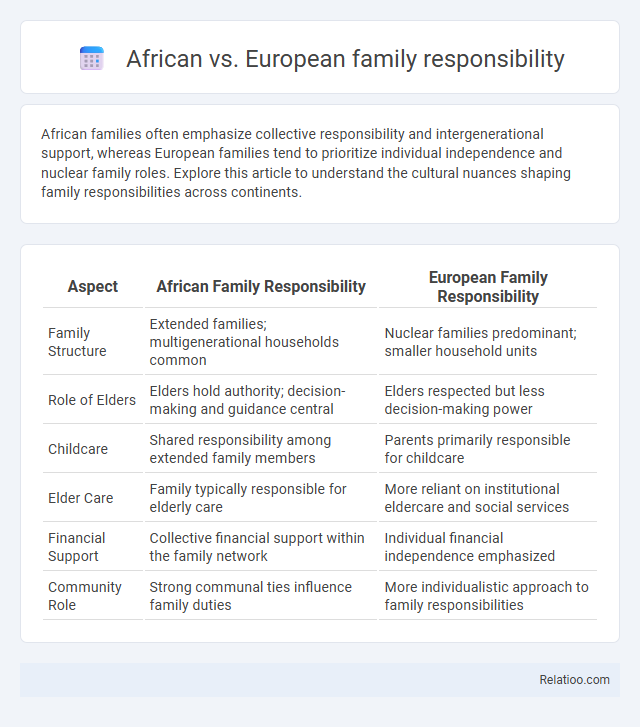African families often emphasize collective responsibility and intergenerational support, whereas European families tend to prioritize individual independence and nuclear family roles. Explore this article to understand the cultural nuances shaping family responsibilities across continents.
Table of Comparison
| Aspect | African Family Responsibility | European Family Responsibility |
|---|---|---|
| Family Structure | Extended families; multigenerational households common | Nuclear families predominant; smaller household units |
| Role of Elders | Elders hold authority; decision-making and guidance central | Elders respected but less decision-making power |
| Childcare | Shared responsibility among extended family members | Parents primarily responsible for childcare |
| Elder Care | Family typically responsible for elderly care | More reliant on institutional eldercare and social services |
| Financial Support | Collective financial support within the family network | Individual financial independence emphasized |
| Community Role | Strong communal ties influence family duties | More individualistic approach to family responsibilities |
Introduction to Family Responsibility: African vs European Perspectives
African family responsibility emphasizes communal support, interdependence, and collective well-being, often involving extended family members in daily life and decision-making. European perspectives on family responsibility tend to focus on individual autonomy, nuclear family structures, and legal obligations toward immediate relatives. Your understanding of these cultural differences highlights how family obligation varies across societies, shaping social roles and expectations.
Historical Foundations of Family Roles
African family responsibility historically centers on communal care and collective upbringing, deeply rooted in extended kinship networks that emphasize mutual support across generations. European family obligation traditionally highlights nuclear family roles, shaped by legal frameworks and religious doctrines enforcing parental authority and filial duties. Understanding these historical foundations helps you grasp how cultural legacies continue to influence contemporary expectations of family roles and responsibilities in both societies.
Cultural Values Shaping Family Responsibility
African family responsibility emphasizes communal support and interdependence, reflecting cultural values that prioritize extended kinship networks and collective well-being. European family obligation often centers around individual autonomy and nuclear family roles, shaped by values of personal independence and legally defined responsibilities. These contrasting cultural values influence how family members perceive duties, caregiving, and resource sharing within their respective societies.
Extended vs Nuclear Family Structures
African family responsibility often emphasizes strong extended family structures where obligations extend beyond the nuclear unit to include grandparents, aunts, uncles, and cousins, fostering communal support and shared resources. European family responsibility typically centers on the nuclear family, prioritizing the immediate household with clearer boundaries and individual autonomy regarding obligations. Understanding these differences helps you navigate cultural expectations around family care, support, and duties in diverse social contexts.
Economic Implications of Family Obligations
African family obligations often emphasize collective responsibility, where extended family members contribute financially and share resources to support each other, leading to a communal economic structure that cushions individual economic shocks. In contrast, European family responsibility typically centers on nuclear family units with legally defined financial duties, resulting in more individualized economic management and reliance on social welfare systems. These differing frameworks significantly impact economic behaviors, wealth distribution, and social safety nets within each society.
Gender Roles and Family Dynamics
African family responsibility often emphasizes collective roles where gender roles are distinctly defined, with men traditionally seen as providers and women as caregivers, fostering interdependence and communal support in family dynamics. European family obligation tends to highlight individual responsibility and gender equality, with shared parental duties and flexible roles shaping more egalitarian family structures. These cultural distinctions influence how responsibilities are negotiated, impacting emotional bonds, decision-making processes, and the distribution of care within families.
Intergenerational Support Systems
African intergenerational support systems emphasize collective family responsibility, where extended kin networks actively share caregiving and financial duties across multiple generations. European family obligation tends to be more individualized, with nuclear families primarily accountable for support, often supplemented by state welfare programs. This divergence shapes differing social safety nets, cultural expectations, and longevity of intergenerational care in both regions.
Social Expectations and Community Involvement
African family responsibility often emphasizes collective social expectations and deep community involvement, where extended family members actively support each other's well-being, reflecting strong family obligation values. European family obligation tends to focus more on the nuclear family, with social expectations encouraging individual autonomy while still maintaining supportive ties through more limited community engagement. Your understanding of these cultural distinctions can enhance respectful interactions and foster effective community support frameworks.
Legal Frameworks Governing Family Responsibility
Legal frameworks governing family responsibility in African countries often emphasize communal obligations and extended kinship roles, reflecting traditional values that prioritize collective welfare and support. European legal systems typically focus on individual rights and nuclear family responsibilities, codifying obligations such as child support and spousal maintenance within statutory laws. Understanding these differing legal approaches helps you navigate family obligation expectations whether in African or European contexts.
Contemporary Shifts and Future Trends
African family responsibility traditionally emphasizes collective support and interdependence, deeply rooted in communal values and extended kinship networks. European family obligation increasingly centers on nuclear family autonomy and individualism, reflecting socio-economic changes and welfare state structures. Your understanding of these evolving dynamics highlights the contemporary shifts towards balancing tradition with modernization, where future trends suggest hybrid models incorporating both communal and individual responsibilities.

Infographic: African vs European family responsibility
 relatioo.com
relatioo.com